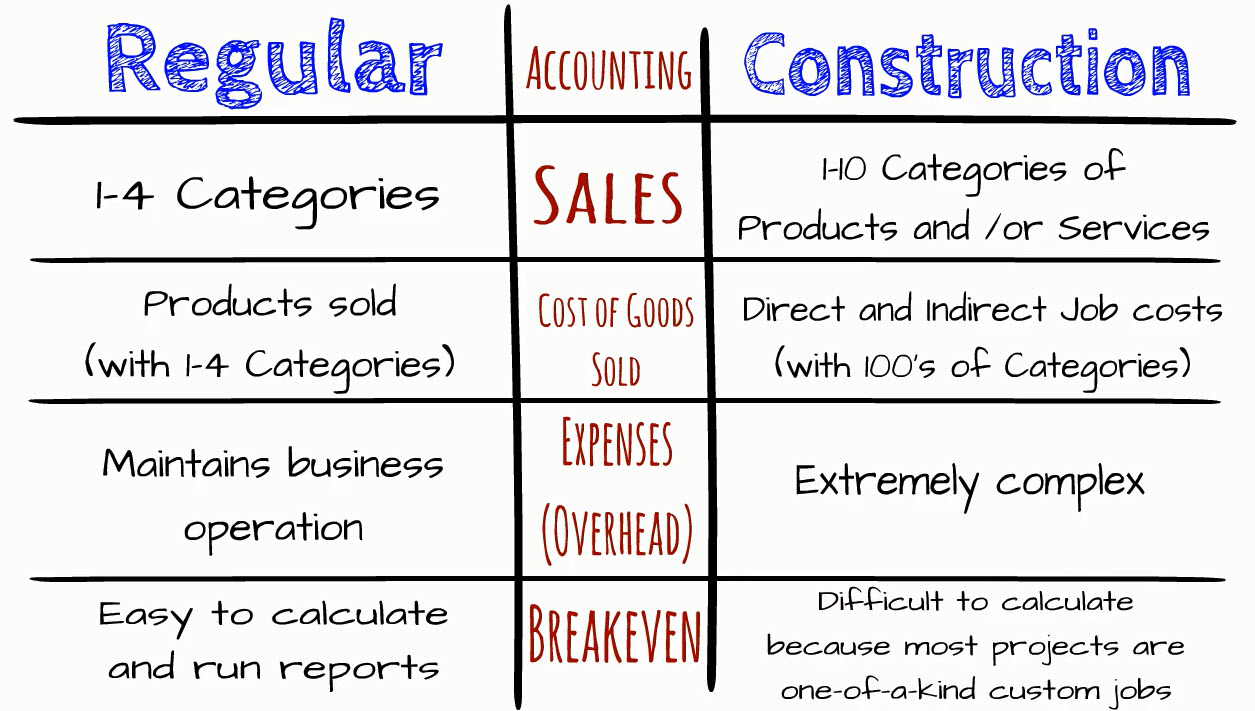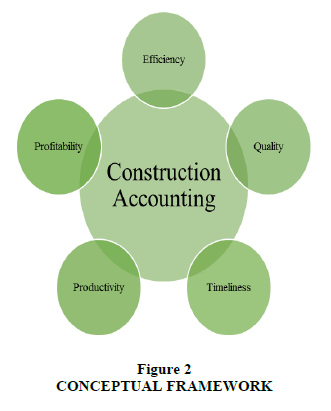Construction Accounting: How to Keep Your Projects Profitable and Financially Stable
Recognizing the Value of Construction Bookkeeping for Successful Job Administration

Role of Building And Construction Audit
Building and construction accounting offers as the foundation of monetary management in the construction industry, making sure that projects are finished within budget and financial goals are satisfied. construction accounting. This specialized accounting approach addresses the distinct challenges encountered in construction projects, consisting of differing task periods, varying expenses, and several stakeholders
Among the key duties of construction accountancy is to give accurate expense evaluation and monitoring throughout the job lifecycle. This promotes informed decision-making, enabling task managers to change timelines and resources successfully. Furthermore, building accounting boosts capital monitoring by monitoring accounts receivable and payable, hence making certain that funds are readily available for prompt payments to subcontractors and providers.
It furnishes project supervisors with the necessary economic data to prepare detailed economic declarations, which are important for audits and economic reviews. Eventually, the duty of construction accounting expands past mere monetary monitoring; it is essential to calculated planning and operational effectiveness, driving the success of building and construction projects in a competitive landscape.
Key Components of Building Accounting

Budgeting establishes a financial structure that overviews project execution, allowing managers to designate sources successfully and expect possible economic challenges. Exact expense monitoring is important for monitoring costs in real-time, helping to identify differences between predicted and actual costs. This allows prompt adjustments to keep the task on budget.
In addition, monetary reporting provides stakeholders with a clear picture of the job's monetary health and wellness. Normal reports, such as revenue and loss statements and money circulation evaluations, help with notified decision-making and enhance transparency amongst all parties included.
In addition, compliance with industry policies and accounting requirements is vital. This ensures that monetary methods are not just efficient however additionally lawful, safeguarding the organization versus legal repercussions. By incorporating these key parts, building accounting promotes an organized technique to handling funds, inevitably adding to the successful conclusion of building jobs.
Benefits for Project Supervisors
Leveraging effective building audit practices supplies task supervisors with a multitude of benefits that improve both operational efficiency and monetary oversight. One substantial benefit is improved budget plan management. Precise tracking of revenues and expenses allows task supervisors to keep an eye on monetary efficiency in actual time, making sure jobs remain within spending plan and facilitating prompt modifications when needed.
In addition, building accounting simplifies money circulation management, making it possible for project managers to expect monetary needs and optimize source allotment. By recognizing cash money inflows and discharges, they can much better handle payments to suppliers, staff members, and subcontractors, consequently preventing costly hold-ups.
Additionally, durable bookkeeping systems give detailed coverage abilities. Project supervisors can generate reports that provide understandings right into job profitability, price variations, and source usage. This data-driven strategy promotes educated decision-making, allowing supervisors to determine possible concerns proactively and carry out rehabilitative actions.
Finally, adherence to building accounting criteria ensures compliance with governing and lawful requirements, lessening the danger of disagreements or penalties. In general, reliable building and construction audit outfits task supervisors with the tools essential to drive job success, enhance stakeholder self-confidence, and promote long-lasting business development.
Common Difficulties in Building And Construction Bookkeeping
Numerous project managers come across considerable obstacles in construction audit that can prevent project success. Among the key difficulties is the complexity of tracking several task websites, each with distinct budget plans, timelines, and resource allocations. This calls for precise interest to information, which can be frustrating without a durable audit system in location.
Furthermore, changing material expenses and labor prices can make complex budget management, making accurate forecasting tough. Project supervisors frequently have a hard time to fix up these prices with actual expenses, causing potential economic disparities.
Additionally, building accountancy involves conformity with numerous policies, including tax obligation commitments and labor regulations. Browsing these policies can be overwhelming, especially for managers who may not have a strong accounting history.
Another significant challenge like this is managing money circulation, which is important in the building industry. Hold-ups in invoicing, payments from customers, or unanticipated job adjustments can develop capital lacks, jeopardizing the job's progression.
Finally, efficient interaction between project managers, accounting professionals, and area groups is vital. Misconceptions can lead to unreliable monetary reporting, better making complex project management initiatives. Resolving these challenges proactively is important for effective building bookkeeping.

Ideal Practices for Effective Audit
While navigating the intricacies of building and construction bookkeeping can be challenging, embracing ideal techniques can substantially boost monetary management and task success. One basic technique is keeping accurate and prompt records. Carrying out durable accounting software tailored to construction jobs can enhance information entry, invoicing, and coverage, conserving and lowering mistakes time.
Additionally, establishing a clear spending plan and routine monitoring versus this spending plan are vital. Utilizing a system of routine monetary reviews allows project supervisors to identify differences early, facilitating timely decision-making. It is also vital to separate task prices right into straight and indirect categories, enabling clearer insights right into success.
An additional best technique includes promoting open interaction amongst all stakeholders. Routine updates and collective discussions about financial status can make sure everyone is straightened and educated. Training team in construction-specific accounting principles additionally boosts competency and accuracy.
Last but not least, making certain conformity with relevant audit criteria and regulations is non-negotiable. Regular audits and interior testimonials contribute to openness and responsibility, constructing depend on with clients and stakeholders. By concentrating on these best methods, building and construction firms can enhance their accounting procedures, ultimately driving task success and financial stability.
Conclusion
Finally, building bookkeeping plays a pivotal duty in ensuring effective project monitoring by promoting precise financial oversight and boosting decision-making. By integrating essential components such as price evaluation, money circulation monitoring, and compliance, project managers can browse typical difficulties and leverage ideal techniques for effective accountancy. Ultimately, a durable construction accounting framework not only safeguards budget plan honesty yet likewise adds to the total financial health of construction jobs, promoting sustainable success within the industry.
By incorporating these essential components, building and construction accountancy fosters a structured method to handling financial resources, ultimately adding to the effective conclusion of building and construction jobs.
Exact tracking of profits and costs permits job managers to keep an eye on monetary performance in genuine time, making certain jobs stay within spending plan and assisting in prompt adjustments when necessary.
Job supervisors can produce records that provide insights into task profitability, price variances, and resource application.Many job supervisors run into substantial difficulties in construction accountancy that can hinder project success. construction accounting. Eventually, a durable building audit structure not only safeguards budget stability however likewise adds to the overall financial health and wellness of building and construction right here projects, promoting sustainable useful content success within the industry